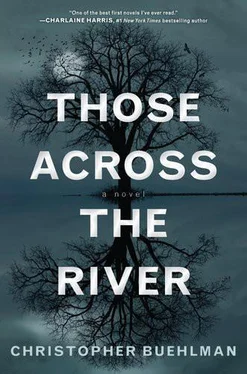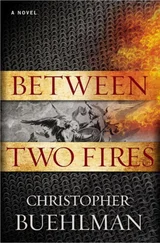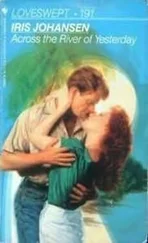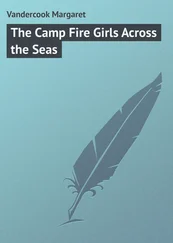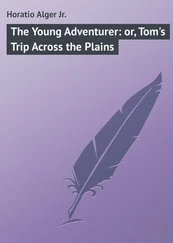She spoke into my ear.
“Music’s nice. I remember this one. What’s she saying now?”
“That he will learn about sorrow. Someone else will take him to school the way he did her.”
She moved against me so our embrace became a dance. I took her hips in my hands and swayed with her, bending my head down to her.
“You with your shoes on,” she said. “I feel so short.”
“It’s about to end.”
“Start it over.”
I did.
We danced without speaking the second time through. Her strange smell in my nose. I held her tightly, but not as tightly as I wanted to.
The next several days passed as that day did, full of dreams and whiskey and sleep, the sleepwalking of my wife, her hungry lovemaking, her greedy belly.
And then I went back into the woods.
IT WAS THE last day of October.
Halloween, but nobody celebrated it here.
Although Dora and I had never joined the people of town in their Sunday devotions at the church (covering ourselves with the tattered rags of my Catholicism), I could almost hear Pastor Lyndon intoning, “If God wanted you to have a false face, He’d have given you one.”
Funny that flower-bedecked sacrificial pigs struck him as Christian, but only heathens made jack-o’-lanterns.
We met at the cemetery just before dawn.
Buster Simms handed bullets of silver out to each man in the requested caliber. The gunsmith in the mill town had gouged Buster terribly for the work because the metal was so much harder to melt and fashion than lead, with the result that most men could afford only a few rounds—although Saul had paid for twelve with his daddy’s money, enough to fill his rifle twice. He had insisted on fitting the bullets into the casings himself and had stayed up all night measuring and re-measuring the propellant, seeing to his father’s and brother’s .30-30 shells as well. They took five each.
I requested seven, enough to fill the clip with one in the chamber. These slugs were solid silver; the ones I had gotten from the silversmith were lead with filings in the nose, capped with wax. I had no way of knowing if they would do more than hurt. I thought so, but I was glad to have the solid rounds. The four weaker slugs went last into the clip and in the chamber; the more potent ones, four of them loose in my jacket, would be the last rounds I shot. In case the first ones didn’t do it.
I would have liked to have heard the conversation between Buster and the gunsmith; the silversmith had asked me if I was shooting at haints. Once he explained to me what a haint was, I said he wasn’t too far off.
Buster looked at us, the men he had gathered. He had stood himself near the freshly turned earth beneath which Ursula Noble’s ashes rested in her mother’s jewelry box. This box sat atop the coffin containing what remained of her mother. Buster wasn’t good at talking to groups of men so he let that mound of black dirt do the talking for him. It would say the right things to make of us the vengeful men he wanted, men who would have the strength to go into the country of our enemy and act. Ursula’s father was the first one to speak. His eyes were dry and hard. He snugged his .38 into his waistband and said, “We goin?”
“Yep,” Buster said.
And that was how it started.
Nine men went into the woods.
Myself. Buster Simms. Saul, Lester and John “Old Man” Gordeau. Dr. Harlan McElroy. Arthur Noble. Lawton Butler. The young carpenter Charley Wade.
Three dogs went also.
Lester had these dogs leashed, dogs his father had seen whelped and sold, but had now bought back. Even though he had only worked with them for less than a month, Lester knew these dogs and they knew him. The female, Delilah, was the biggest and best behaved. The boys, Mustard and Shep, had long since tested her and found themselves lower on the rope, so what she did they did.
The Gordeaus had taken these dogs to the Noble place to get their talented noses full of that smell. Their smell. It was strong to the dogs. They hated it and yet they pulled towards it, wanting their masters to extinguish its source. I was sure the dogs knew more about what was in the woods than we did; they had read libraries in the musk and saliva and hair left at the murder scene, and only Delilah’s faith in Lester’s divinity fortified her to drive the other two dogs towards those across the river.
We kept a good pace on the first leg of the journey. We crossed the river pulling the raft across in groups of three. Nobody said it, but all of us sensed that this time was for keeps, and that our hunt would turn around on us if we had not come back across by sundown.
As labyrinthine as those woods were, it was hard for me to see how we would.
We stopped at Magi Rock long enough to drink and to let the animals drink, and then we kept on. Summer was over now and the cool air let us push long and hard without rest. We had left the trail hours ago. None of us knew exactly where we were, but I got the idea that the dogs had been chasing something in circles, or, since we always seemed to be on new terrain, in a sort of broad, lazy spiral.
Looking up, I saw how yellow the trees were above us. Were we on higher ground? It was colder here than in town. Autumn was moving faster here.
It was a little like the Argonne, but for once I was afraid of something besides nonexistent Germans. The fear was almost good this time. There was a reason.
The dogs, who had been pulling us forward with purpose for many hours, were now becoming frantic. Lester had no gloves, so I’m sure even his callused hands were becoming raw from the strength in the leashes.
“Somethin’s close,” he said.
Time slowed down for me as it always did in the moments before some event. I looked down and saw my feet moving towards whatever was out there. One of my boots knocked the top from a mushroom. Sweat trickled in my shirt despite the chilly air. The air smelled clean and good. I opened my mouth to try to hear something besides the baying of the dogs, but I could not.
I marched forward with the rest of them.
Movement in the trees made Saul stop and raise his rifle, and the rest of us raised our weapons, too.
Something in the trees off to the left.
One of them.
I felt a tremor in my hands but willed it to stop. I rested my thumb on the hammer of my pistol.
One of them.
The dogs knew.
I knew, too. Which one of them it was. Knew it as surely as I had known my father was dead that night my telephone rang near midnight.
Where are your pants, my friend?
A flash of red in the trees.
“Show yourself,” Old Man Gordeau croaked next to me, then Buster said it louder.
The red flash again, faded cloth.
Pale yellowish skin.
“Hold your fire,” Buster said. “It’s a little girl.”
I moved sideways to get a better look.
I saw the dress, an old dress, faded nearly pink in places, hung on a small, thin figure standing in the brush fifty yards out.
But it wasn’t a girl. It was a mulatto boy of about thirteen.
The same boy.
The boy with no pants.
The dogs were losing their minds, barking with wide eyes, spittle flying from their mouths.
“God,” I said.
“Come over here to us,” Buster said.
But it didn’t move.
“Watch her,” Old Man Gordeau said, shouting over the dogs.
“I think that’s a boy,” said Charley Wade.
“God,” I said again.
It put its thumb in its mouth like a small child might, but there was no innocence to it.
I found my voice.
“That’s one of them. I’ve seen him.”
Saul raised his rifle.
“What do I do?” he said. “I don’t want to squeeze on no little boy.”
Читать дальше
